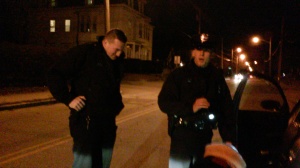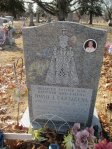On New Year’s Eve, we had dinner at our house with a couple of friends, and then the four of us piled into our friends’ car and headed out for our neighborhood bowling alley. A few minutes into the drive, we noticed a weird rattling. Our friend pulled over and climbed out to investigate. Flat tire. So we all climbed out and set about changing the tire.
Easier said than done. First we had to pry the spare out of the trunk, and then we had to find the special tools, and then we had to figure out how to use them. It didn’t help that we were standing in the dark on a relatively high-speed through-street. Plus, it was cold.
We were huddled around the trunk, trying to read the instructions on the tool bag by the light of the tail lights and our phones’ flashlight settings, when a police car cruised by. Oh good, we thought. Help has arrived. And it had.
The cop angled his car protectively behind ours and trained his headlights on our work area. We would have been grateful enough just for the light and the protection. But the officer – a slight, young white guy with a band-aid on his finger – didn’t stop there. When he realized that we hadn’t called a road service and that we were having trouble changing the tire, he pulled out his flashlight, studied the instructions, and went to work.
It didn’t take him long to get the car jacked up and remove the first couple of lug nuts. But neither he nor any of the rest of us had the strength to loosen the last lug nuts and get the flat off the car.
As luck would have it, a second police car came by. It parked up behind the first one, and the cop strolled over to see what was up. This second officer was taller and beefier than the first one. By jumping on the lug wrench a couple of times, he was able to free the flat tire.
What would we have done if the cops hadn’t come? What would we done if they hadn’t been so helpful? How could we thank them? We asked for their names so we could write a letter to their chief. But they waved the question aside.
“That’s not necessary,” the first cop said. “Next time you get in trouble like this, you should call us.”
The second cop took a picture for the department’s Facebook page. “This will be great for community outreach,” he said.
We agreed. Those cops were good guys who do a difficult, dangerous and necessary job, and they went above and beyond what that job requires.
We all shook hands, wished each other a happy New Year, and went our separate ways. The first cop’s shift was almost over. The second one would be working until 8 the next morning. And we had a date with our local bowling alley.
___
We live in the Edgewood section of Cranston, Rhode Island, a relatively prosperous neighborhood of large, well-kept, owner-occupied homes between Narragansett Bay and Roger Williams Park. Like most of our neighbors, we and our friends are white, conservatively dressed English speakers. Our car was clean and – except for the tire – in good shape. And the four of us were old enough to be the police officers’ parents.
The bowling alley is less than two miles from our home. But to reach it from the block where we pulled over, we had to cross the railroad tracks and Route 95. The bowling alley is on a busy street across from a discount grocery store, in a neighborhood where most residents rent. The other bowlers were all younger than us by at least two decades. They included people who had prominent tattoos, who weren’t white, and who weren’t speaking English.
Looking around, as we bowled through the last hour of 2014, I couldn’t help but wonder. What would the experience have been like if the flat tire hadn’t happened to us, in our neighborhood? What if it had happened to one of the other bowling parties at the alley? Would the cops have gone that extra mile? And how would we have felt, when that first cruiser pulled up, if we were younger, or less white, or if English wasn’t our first language? Would our first thought have been, Help has arrived?
















